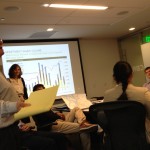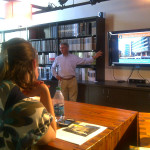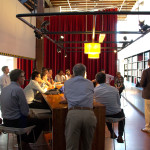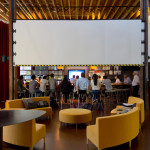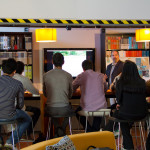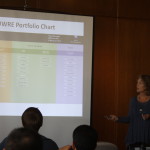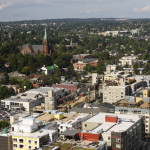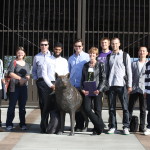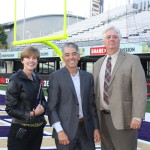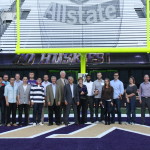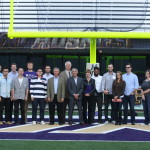On Tuesday, November 26 from 1:00 – 2:00 in Gould Room 440, the Runstad Center will host a brown bag with Amy Sallin and Sam Ogle of the Buerk Center for Entrepreneurship at the UW Foster School of Business. Sam will be presenting the Entrepreneurship Certificate program which a number of MSRE student peers and predecessors have used their interdisciplinary electives to complete. Amy will be discussing the Business Plan Competition which is held each year during Spring Quarter. MSRE students have competed and done very well – Chris Bajuk won the competition two years ago with his Urban Harvest plan, and last year a team of students made it to the round of 16 with Elemental Hotels, a micro-hotel concept. All CBE students with an entrepreneurial bent are encouraged to attend – this is a great chance to learn more about the opportunities here at the UW to support your aspirations. See you there!
Category: MSRE
Second-year students head to Chicago for the 2013 ULI Fall Meeting
The Runstad Center sent several students from the MSRE class of ’14 to Chicago last week for the 2013 ULI Fall meeting. Guest blogger Louisa Galassini writes in about their tour to the Roosevelt Square neighborhood, below.
Public Housing Redux: Roosevelt Square
The Chicago Housing Authority (CHA) was founded in 1937 and is currently the largest owner of rental housing in Chicago, providing housing to over 50,000 people. Despite this, the history of pubic housing in the city is marred with violence and controversy. In the 1950’s and 60’s, the CHA developed 11 high-rise buildings concentrated in poverty-ridden areas. The height and design of these projects made them difficult to monitor and fueled dangerous and violent behaviors in their residents.
In response to the problems, Dorothy Gautreaux and several other CHA residents filed a lawsuit against the CHA for isolating their developments in areas of concentrated poverty. The suit took 30 years to come to resolution, but in 1996, the case of Gautreaux v. Chicago resulted in a takeover of the properties by the US Department of Housing and Urban Development (HUD) and a consent decree to redevelop the housing projects.
In order to revamp this public housing, Mayor Daley helped establish the “Plan for Transformation” – a redevelopment at the site of former public housing towers in Chicago’s Near West Side. The plan was built with the concept of mixed-income housing, providing 1/3 public housing, 1/3 affordable, and 1/3 market rate units, and currently stands to become the largest public housing redevelopment in the country.
Related Midwest was selected as the master developer for this new “Roosevelt Square” neighborhood. The project spans 135 acres, with 4,441 housing units to be completed in 6 phases. There is a 45/55 mix of rental and for sale housing, serving income ranges of 60-120% AMI in addition to Section 8 housing and market rate units. The original timeline anticipated completion in 2020, but the recession in 2008 caused major delays and currently only 500 units have been completed.
The housing style is notably different from its high-rise counterparts, which have long since been demolished. The community requested traditional Chicago building styles, producing almost entirely 3-flat brick structures in the first phase. With a relatively unchanging ground plane, similar building types and finishes, and a lack of product type the neighborhood is far from dynamic. Limited in how it is able to spend funds, hopefully the CHA can find creative ways to bring vitality to this new development.
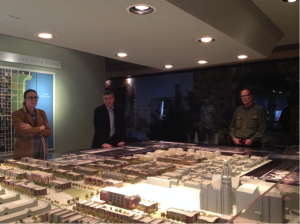
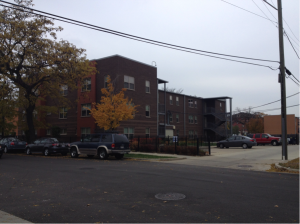
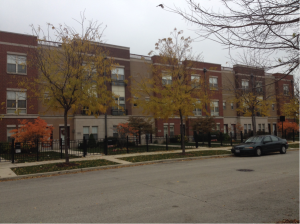
Call for applications: Hines Competition 2014
ULI/Gerald D. Hines Student Urban Design Competition — Open to CBE Graduate Students – $50,000 Prize
Attention students… the ULI/Gerald D. Hines Student Urban Design Competition is one of the most prestigious academic design competitions in the country. Open only to graduate students, each team selected to participate by the ULI will have two weeks to devise a comprehensive design and development program for a real, large-scale site full of challenges and opportunities. Submissions will consist of boards that include drawings, site plans, tables, and market-feasible financial data. The competition will be conducted from January 13 to January 27, 2014. First prize for the winning team is $50,000, which is divided evenly among each of the team members. Here is the competition website.
The rules state that each team is to be multidisciplinary and comprised of no more than five (5) students from a minimum of three disciplines that grant three (3) different degrees, one of which must be a non-design-related discipline. Given this criteria, we believe that the College of Built Environments is perfectly positioned to compete in this event. Therefore, students from Architecture, Landscape Architecture, Urban Design and Planning, Construction Management and Real Estate are invited to submit their names in nomination to each of their respective department chairs for consideration. Your intention will only be recognized by submitting a one-page resume. Although all are welcome, a first priority will be given to our second-year students. Given the dates of the competition, special permission from either your department chair or individual professors may be required. Since the ULI application deadline for each team is December 9, 2013, your one-page resume must be submitted by November 22, 2013.
We look forward to putting together a winning team! Please direct questions and applications to Stephen O’Connor, Director, Runstad Center for Real Estate Studies (steveoco@uw.edu)
New winter course offered in Affordable Housing and Development
Winter 2014 Housing Policy – flyer and link to registration info
The Runstad Center is pleased to announce a new Winter 2014 Course Offering:
RE 598D Special Topics: Affordable Housing & Development
Wednesdays, 6-8:50 pm
Gould 114
Instructor: Al Levine, Deputy Executive Director, Seattle Housing Authority (Retired)
Class Overview
This course is intended as a broad introduction to the field of affordable housing, which will guide the student through the affordable housing development process and the policy issues that must be addressed to successfully plan, finance, design, construct and manage affordable housing.
Using Seattle as a contemporary laboratory, the class will examine the Yesler Terrace redevelopment project as an example of a 21st Century approach to affordable housing in the context of smart growth, sustainability and social equity. In the process, students will gain a historical perspective of affordable housing, as well as a current understanding of the programs and issues that Seattle and other major metropolitan areas face in trying to address the shelter needs of low and moderate-income households.
In addition, the relationships of federal tax and budget policy, as well as the role of federal, state, local, non-profit and private sector agencies and participants will be examined.
By the end of the class students will have gained a strong familiarity with the broad range of affordable housing development programs as well as contemporary policy issues related to affordable housing in the United States. Additionally, an understanding of affordable housing development and finance, as well as the public/private process required to successfully develop affordable housing will be achieved.
About the Instructor:
Al Levine, who holds a Masters degree in Urban Planning from the University of Washington, is the former Deputy Executive Director of the Seattle Housing Authority (SHA). During his tenure at the SHA, Professor Levine was the principal in charge of the Yesler Terrrace Redevelopment Project. A nationally recognized expert in the field of affordable housing policy and development, Professor Levine brings an abundance of knowledge and real-world experience to the subject.
Orientation is a wrap… and a new school year is underway!
Incoming MSRE students just completed an intensive six-day orientation program, which included a series of briefings and project tours throughout the region. Highlights included an opportunity to tour the new Husky Stadium and hear a real estate insider’s backstory on the complex financial and construction management aspects of that project from Walt Ingram, CFO of Wright Runstad & Co., and Chip Lydum from UW Athletics. Orientation also included a road trip through downtown Seattle and the Eastside, with presentations from Carolyn Davis and John Torrance at CBRE on the Seattle market, Jim Melby from Kemper Development on downtown Bellevue, and the Microsoft real estate team in Redmond. The group also rode the Washington State Ferries across Puget Sound to the city of Bremerton, where advisory board member Cary Bozeman gave a presentation on public-private partnerships and economic develpment. Students heard from Jon Rose, president of the Olympic Property Group, and Taylor Caroll with Forterra on rural development at Port Gamble and innovative transfer of development rights initiatives. The session was held at the LEED platinum-certifed offices of the architecture & planning firm Rice Fergus Miller, which renovated the former Sears store in downtown Bremerton into an über-cool and highly sustainable office and meeting space. Students also heard presentations on major new developments in the region including the Seattle Housing Authority’s Yesler Terrace project, and Wright Runstad & Co.’s Spring District project in the Bel-Red corridor. The group then visited current MUP-MSRE student Nathan Daum, who has a year-long internship at the UW Real Estate Office. Advisory board member Jeanette Henderson and others on her staff discussed the unique challenges presented in managing the university’s extremely diverse real estate portfolio.
Students also spent many hours in “boot camp,” learning Excel proforma modeling techniques by working closely with our own PhD student Andy Krause. The whirlwind week culminated in a reception hosted by the Runstad Center Advisory Board, where the new students were introduced to the real estate community and mingled with board members, internship sponsors, mentors, alumni, and other friends of the Runstad Center.
We at the Runstad Center offer our sincerest thanks to all who contributed their time and energy to this exciting introductory period for our new students, and we extend a warm Husky welcome to the incoming MSRE class of 2015!
Chris Bitter awarded 2013 Lionel H. Pries Teaching Award
The Runstad Center for Real Estate Studies is pleased to announce that Prof. Chris Bitter was named as the 2013 recipient of the Lionel H. Pries Teaching Award, selected by the students of the College of Built Environments.
Prof. Bitter’s background combines academic training in urban and economic geography with ten years of applied real estate research experience. Prior to joining the University of Washington, he was a faculty member in the Department of Geography at the University of Arizona. His research focuses on market dynamics, urban economics, and sustainable development. At the Runstad Center, he teaches three core courses in Real Estate Appraisal, Market Analysis, and Urban Land Economics.
“Chris Bitter always shows up prepared to deliver an effective lesson plan. Through his consistent teaching methodology Chris clearly articulates the essential real estate fundamentals that influence all aspects of the built environment. For his dedication to providing students with a solid foundation in real estate economics, market analysis and valuation, Chris was selected as the 2013 recipient of the Lionel Pries award,” says Dave Knight, MSRE class of 2013 and former president of the MSRE Student Council.
“I’m deeply honored to be recognized by the students of the College of Built Environments as the top teacher in 2013,” says Prof. Bitter. “This award attests not only to my dedication to teaching, but also to the quality of my students and their devotion to learning. Thank you all for your support!”
Lionel H. (“Spike”) Pries (June 1, 1897 – April 7, 1968), was a leading architect, artist, and educator in the Pacific Northwest. In the mid 1980s, students in the College of Architecture and Urban Planning (now CBE) established this student-selected award in his name to honor excellence in teaching.
Congratulations Class of 2013!
On a sunny afternoon in June, sixteen students celebrated 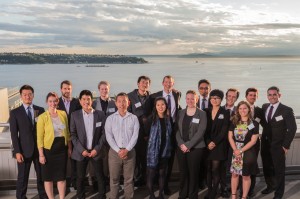 months and years of hard work and dedication to making their dreams of becoming qualified and employable real estate industry professionals a reality.
months and years of hard work and dedication to making their dreams of becoming qualified and employable real estate industry professionals a reality.
The theme of the day was transformations and transitions. Not only were the students doing a lot of both but it was also recognized that Runstad’s programs are following that trend as well. Only 3 years young officially, the program, thanks to the feedback and collaboration from its students, is transitioning and transforming into something very special, a highly sought-after and critical real estate education.
Runstad benefactors, Jon and Judy Runstad, brought this to light in their speech to graduates. They recognized the power of a high quality education in today’s complex industry and just how valuable each student is to the future of the profession. Their words also included references to Runstad’s incredible Advisory Board, who, they promised, will remain a trusted resource as graduates move forward into their careers.
Steve O’Connor, Runstad’s Director, echoed Jon and Judy’s sentiments, telling students that his job is to ensure the value of their degrees, and that part of that dedication includes creating connections to the professionals in the community like the Board.
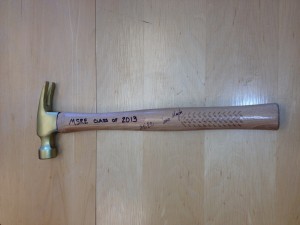 The Class of 2013, in turn, gave Steve a golden hammer as a parting gift. The hammer, they said, represented Steve’s tireless devotion as “the hammer” in helping to transform the program into the exceptional real estate education they have all experienced during their time at Runstad.
The Class of 2013, in turn, gave Steve a golden hammer as a parting gift. The hammer, they said, represented Steve’s tireless devotion as “the hammer” in helping to transform the program into the exceptional real estate education they have all experienced during their time at Runstad.
Congratulations to each of Runstad’s stellar graduates!
MSREs are finalists in UW business plan competition!
2nd year MSRE students Alvaro Jimenez, Dave Knight, and Mary Fialko are creating a buzz in the annual University of Washington Business Plan Competition! They’ve advanced to the “Sweet 16″ round of finalists — go team! Check out their idea for Elemental Hotels at http://www.elementalhotels.com/.
2013 NAIOP Real Estate Challenge
As a capstone output for the two-year UW MSRE curriculum, many of the program’s students participate in an intensive Real Estate Development Studio. This year’s studio was focused on generating an exciting waterfront redevelopment proposal for South Lake Union in response to the 2013 NAIOP Real Estate Challenge.
UW students prepared not just one, but two fantastic proposals for the exciting sites that they were given to work with:
The proposals were prepared by diverse, interdisciplinary graduate students with a passion for real estate. For more details on many of the students that created these proposals: UW MSRE Class of 2013.

